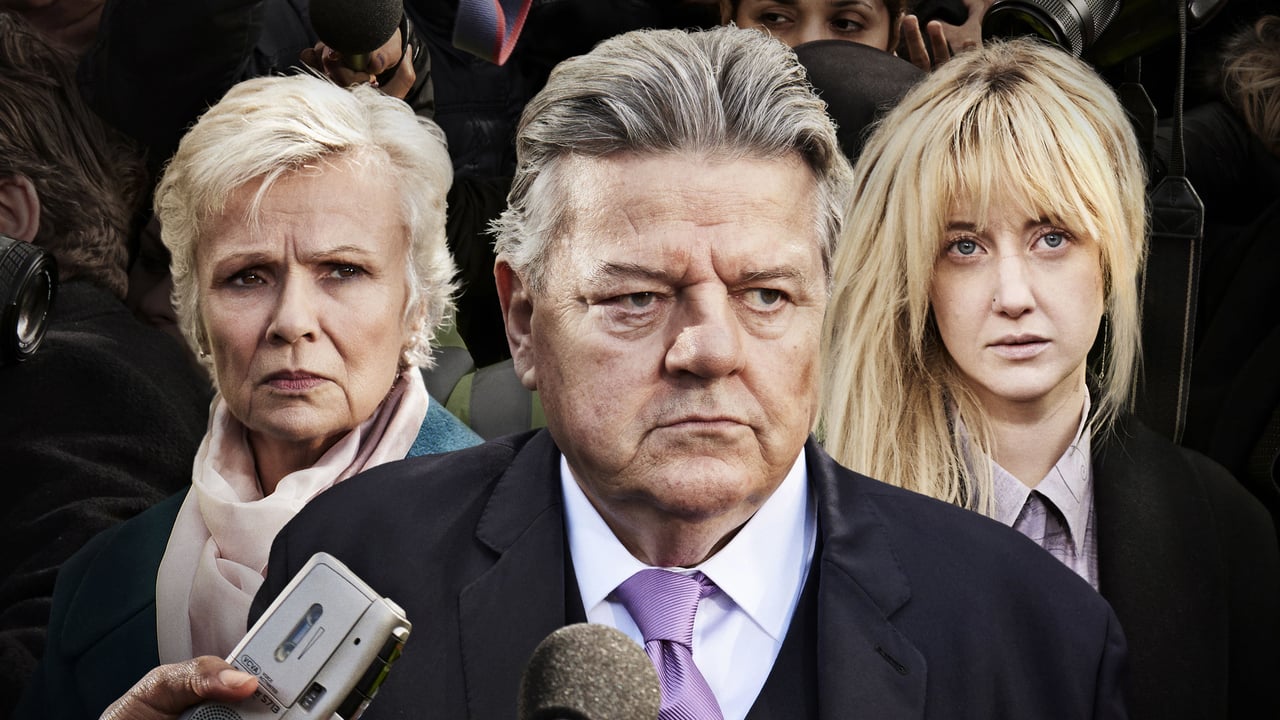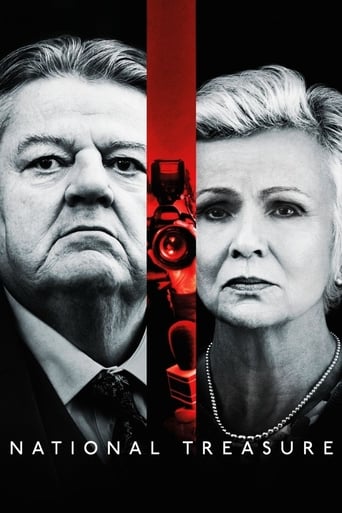

I think this is a new genre that they're all sort of working their way through it and haven't got all the kinks worked out yet but it's a genre that works for me.
... View MoreWho payed the critics
... View MoreGood start, but then it gets ruined
... View MoreOne of the film's great tricks is that, for a time, you think it will go down a rabbit hole of unrealistic glorification.
... View MoreA has been celebrity straight man from a successful comedy team is accused of a rape (by his daughter's former babysitter) that had occurred decades earlier. Subsequently a few other women come forward and also charge Paul with sexual misconduct so Paul (Robbie Coltrane) hires an expensive cracker jack law firm and a private detective to dig into these accusers past and one by one their accusations are proven without merit, except for the (former) babysitter's accusation.Paul's wife, a devout Catholic, named Marie (Julie Walters) and an ardent supporter of her pig of a husband Paul, they have come to an agreement that as long as Paul always tells her about his extra marital affairs the next day she can tolerate his infidelities. Their daughter Dee (Andrea Riseborough) is a mother of two, divorced from her husband and is undergoing treatment for a severe drug dependency as well as emotional scars from her childhood living with her parents unconventional lifestyle.The interactions between mother/wife Marie, husband/father Paul, and their daughter Dee, are constant dialogues of dribble that quite frankly belong more in a daytime soap opera than in an evening dramatic courtroom tv mini-series. By episode 3 I was hoping for some twists and turns but they just never materialized. By the series ending 4 episode I honestly did not care if Paul was guilty or not but after investing 3 hours into the program already Mrs. Shullivan and I took a break, watched a hockey game (our Toronto Maple Leafs won their franchise winning 13th straight game at home) and then returned to watch the lat episode. Guilty or not guilty? I won't spoil it for anybody because as far as I am concerned the whole four (4) episodes were non-descript pieces of light melodrama that were not worth watching in the first place.I give the series a 4 out of 10 rating.
... View MoreThis was a great series. Here is a question: Why didn't Karl come clean in his testimony? It seems like Paul's wife wanted him to testify in way that would confirm the raped woman's version. Did Karl decide that he didn't like her after having spent all those years wishing she could be his?
... View MoreSTAR RATING: ***** Saturday Night **** Friday Night *** Friday Morning ** Sunday Night * Monday Morning In his heyday, Paul Finchley (Robbie Coltraine) was one half of a comedy double act with his partner Karl (Tim McInnery) who were adored throughout the land, but today rests in the side lines, dealing with his troubled addict daughter Dee (Andrea Riseborough) and emotionally distant wife Marie (Julie Walters.) But this all changes when he finds himself arrested over an historical allegation of sexual abuse by a former baby sitter of his daughter, and sinks further and further into an ever wider hole when more women come forward and the allegations mount up. As the stress of the impending trial takes over, and his private life slips further into turmoil, Paul is forced to examine himself over the years, and the actions and behaviours that may have led to his predicament.In the immediate aftermath of the revelations about Jimmy Savile, Operation Yewtree was launched by the Metropolitan police, in an attempt to save face by investigating historical allegations about other, still living former big name stars from the 70s/80s, some of which resulted in convictions. National Treasure, however, seems to be modelling itself on cases such as that of comedian Jim Davidson, who was arrested at an airport upon return from a holiday on the basis of one allegation, which escalated into a witch-hunt where many more women came forward, only for no charges to be brought, in spite of what many could already have claimed was a trial by media. If you follow the news, it's certainly not hard to see the foundations from which this drama drew inspiration, and it certainly comes off in a believable and thought provoking way.The first episode certainly dispenses with its fair share of celebrity cameos, from stars including Alan Carr and Frank Skinner, but it never feels tacky or gratuitous. The most important star is the main one, in the shape of Coltraine, a performer who seems to have been out the limelight for a little bit now, but who makes a revelatory return to form here. As the former icon turned pariah, he fits the skin and bones of the role down to a tee, and it's tough to think of anyone who could have been better suited. The always reliable Walters compliments him perfectly as his understanding, extremely forgiving wife. More than being a riveting courtroom thriller, it works more as a character study and examination of the past and present and how they may have shaped each other.It works on pretty much all the levels it sets out to, and it's an inspired piece in terms of everything that tears a subject from recent headlines and does it proud. ****
... View MoreNewspaper reviewers have predictably commented on the parallels between Jack Thorne's drama and the so-called "Operation Yewtree," in which major celebrities - the "national treasures" suggested by the title - were found to be serial abusers, or used their fame to exploit the vulnerable. The two central performances of Robbie Coltrane as Paul Finchley and Julie Walters as his wife have also received due recognition.Yet Marc Munden's drama contains so many other brilliant aspects, that don't necessarily focus on the more salacious material but try to explore how and why Fınchley should behave as he did. What we understand from the celebrity and his wife is how narcissistic they are; despite their frequent protestations of love for one another, as well as for their daughter Dee (Andrea Riseborough), they are pathologically incapable of listening. Riseborough's characterization is profound; she does not speak much, but she has a way of looking at the ground, almost as if she cannot face the ordeal of communication, especially with her parents. There is one sequence in particular involving Marie and Dee that sums up the emotional disconnect between them; taking place in a bedroom during Dee's birthday party, Marie emphasizes quite vehemently that she wants her daughter to get better, without understanding in the least how she and her husband are the root cause of Dee's problems.Munden's production is distinguished by memorable cinematography from Ole Bratt Birkeland. Birkeland is fond of long tracking shots, with the camera moving down lengthy corridors to discover the characters. As viewers, we feel we are eavesdropping on their private secrets - just like Peter and Marie, as they seek to find out what's "wrong" with Dee. Birkeland also uses lighting to reinforce the theme: during the birthday party Peter gives one of his windy speeches. As he does so, the camera tracks slowly to the left, revealing candles at the front of the frame, and after a few seconds settles on Dee, looking once again at the ground in embarrassment, her face obscured by yet more candled. Material things seem to matter more to Finchley - they can be easily controlled, and do not require him to empathize. The fact that Dee appears at the end of the shot emphasizes her insignificance.Much of the action unfolds in a dream-like world of psychedelic greens, reds, and blues, drawing attention once more to the fantasy-world that Peter and Marie inhabit. Alternatively several sequences take place in darkened rooms, illumined by miserable spotlights; the perfect ambiance for anyone to behave inappropriately without fear of discovery.Despite its pertinent subject-matter, NATIONAL TREASURE is not really about the abusive celebrity, but looks instead at the destructive ways in which parents - especially those who profess a blameless way of life - destroy their siblings, as well as others, through neglect, or by assuming that people will behave in certain preordained ways. The action unfolds slowly in a series of lengthy exchanges punctuated by occasional musical interludes (by Christobal Tapis de Veer, but remains compelling. This is one of the best dramas I have seen on any medium in the entire year.
... View More